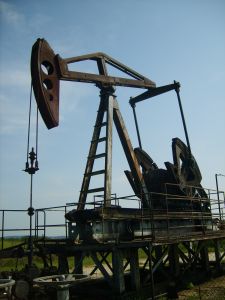 |
| Is fracking the clean energy future? |
My options were hardly inspiring. My dad was slowly dying of Parkinson's and dementia, royally pissed off at the guy he considered his jailer -- me. The news business tanked. The jobs that remained had a bunch of us old veterans lining up. Salaries were 50 percent or less what we had made.
I had purchased a foreclosed house in terrible shape to rent and subsidize the cost of my father's care. On the positive side, it took six months to repair. I relearned a lot of construction skills.
Clean energy to the rescue
Then after seven months, I found another line of work. The American Reinvestment and Recovery Act was by then in full swing, and it covered my salary assisting cities and counties in California's San Joaquin Valley installing energy efficient lighting, cooling systems and even insulation. Not too sexy to be certain, but it offered insight into the entirely new realm of clean energy.
Clean energy at the time still had a lot of hurdles, but with federal stimulus money and constantly increasing costs for fossil fuels the holy grail of cost "parity" appeared attainable. A former co-worker and I started blogging about it, using news gathering talents honed over decades to debut the latest studies, technologies and breakthroughs.
They were heady times.
We thought solar could rescue the economy of California's interior where sun is a never-ending resource. We called it solar valley.
Fracking takes center stage
Now I'm not so sure that prediction is inevitable. Fracking underground oil deposits coincided with that initial solar expansion, providing a new lease on dominance by the fossil fuel industry. Now it's all I hear about in the traditional media. Jonathan Fahey of the Associated Press just wrote, "By now, cars were supposed to be running on fuel made from plant waste or algae — or powered by hydrogen or cheap batteries that burned nothing at all. Electricity would be generated with solar panels and wind turbines. When the sun didn't shine or the wind didn't blow, power would flow out of batteries the size of tractor-trailers."
Alas, clean energy has mostly stalled. The auto industry is still getting more efficient and even diesel trucks are getting cleaner, but electric cars remain just a small percentage of the market, biofuels haven't evolved much and solar's no longer a major political focus.
Instead, natural gas is getting all the ink. North Dakota has gone nuts with derricks everywhere. And a study by the University of Southern California says the Monterey Shale formation under the San Joaquin Valley could provide "nearly 3 million jobs and close to $25 billion in tax revenues by 2020," according to a story by John Cox at the Bakersfield Californian.
It's all about jobs
The news does make me think. I'm still working with grants. It's temporary work. When the money runs out, the position disappears. I don't make what I used to even in the relatively low-paid world of journalism and see potential opportunity. I have a friend from back in my Alaska journalism days who jumped ship to work for the oil industry. Maybe I could too.
There is hydrogen energy, which I still think is the future. Google it and California, and up pops a proposed project to turn petroleum coke (a refinery byproduct) and coal into hydrogen. The CO2 would be stored underground. Interesting.
But a better method would be to turn unused clean energy, like night-time wind production into hydrogen. That could then be used to either power generators or sold for other purposes. Once an infrastructure was built, hydrogen could be a viable alternative for transportation. This last concept was explained to me by the fellow behind Stockton, Calif.-based Hydrogen Technologies Inc.
Unfortunately, I haven't heard much from that operation. Just fracking. Is it inevitable? Perhaps. Will I take a job if it's offered? Could be. My son just got accepted as a junior to Loyola Marymount's screenwriting program, and it's not cheap.
No comments:
Post a Comment